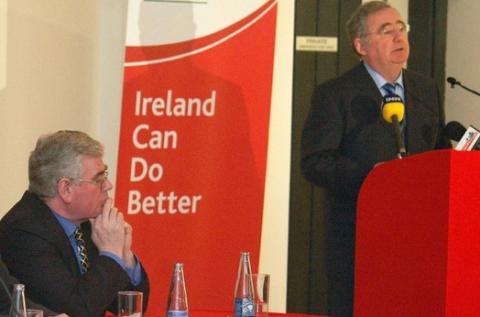Inequality requires Labour to act radically

What is the point of the Labour Party being in government if it again fails to make the tough decisions to tackle inequity in society?By Vincent Browne.
THE VAST majority of the electorate don't want any increase in taxes as a means of resolving the deficit in the public finances, according to the TV3 poll published last week. It shows that 57 per cent favour reducing spending as the sole means of correcting the deficit in the State's finances, as against a combined total of 35 per cent who favour raising taxes as the sole means of correction (17 per cent) or a combination of tax increases and expenditure cuts (18 per cent). Game, set and match to the neocons.
And how could it be any different? Nobody has argued the case here in the last decade for tax increases and nobody has argued the case for equality. The case has been conceded to the other side: taxes bad, cuts better.
It used to be the point of left-wing politics to argue that society should be more equal and that the means of making society more equal was, unavoidably, increasing taxes on the relatively wealthy and redistributing the proceeds to the relatively less wealthy.
The argument went something like this: all wealth is derived from social co-operation and it is the function of society to decide how such wealth should be distributed. The distribution of wealth through the market system is entirely arbitrary and without justification; the tax system must act as a corrective to that arbitrary, unjustified distribution by readjusting wealth in a more equitable way. The idea that we "own" the wealth that the market system arbitrarily distributes is a nonsense – it has no justificatory rationale.
This used to be the commonplace rationale of left politics, but because the left have abandoned the arena of politics, there is no one around to argue this case anymore aside from the radical left, elements of which are more interested in assuring themselves of their own authenticity by the shrill tone of their rhetoric than in persuading anyone else.
Very few argue that more equal societies fare better for everyone – less violence, more literacy, long life spans, better health including mental health. Because there is more respect, there is less social hierarchy, less stress for the less wealthy. Instead we are treated to the old, reflexive right-wing refrain about "old-fashioned communism" with all its cruelties and how socialism has never worked anywhere; it goes against the human grain; it is a defiance of the natural order of things. In the 18th century they said similar things about capitalism and universal franchise.
The left case is hardly ever argued now because the soft left (eg the Labour Party) sees its objective as getting into power and it believes, correctly, that if it comes clean about taxation and equality it will forfeit power (as it believes office to be) to the right wing. And it's better to have the left in office than the right on its own, for incremental gains can be made that make society a little less unequal and a little less harsh for the relatively unwealthy.
The surprise about Labour is that after three long stints, totalling 13 years over the period 1973 to 1997, having achieved nothing at all virtually in terms of equalising this society, it now proposes to do that again without any reflection on what went wrong previously.
I can anticipate the response of Labour to this assertion that it achieved virtually nothing at all in terms of equalising this society in the 24-year period during which it was in government for most of the time: how social welfare was "protected"; consistent poverty reduced; more transparency inaugurated; equality agencies established.
And I just want to refer them to that report Inequalities in Mortality published in 2002 and related to the last period Labour was in government.
It showed that the mortality rate for people in the lower occupational groups was far higher than for those at the top of the occupational pyramid. A conclusion from the report was that 5,400 people died prematurely every year because of the scale of inequality.
This is a devastating commentary on the legacy of the Labour Party but – aside from Liz McManus – they pay no attention at all to this reality. People such as Pat Rabbitte are serious politicians, committed to the social good.
Pat argues the incrementalist line, as far as I understand his position. And he seems to think anything more radical is for the birds because the people won't buy it.
He is dead right about the people not buying anything more radical. But the reason people won't buy it is because the case is never argued. And what is the point of being in politics without trying to persuade people to the line one thinks is the correct one – whatever that may be – but especially so if one is a socialist in the present environment that is so hostile to socialism?
Of course, it means sacrificing the prospect of office for maybe a generation. But what is the point of another stint in office if after it is over – be it five or 10 years – society is essentially as unequal as it is now and the perniciousness of that equality is only marginally mitigated? Especially as in the meantime the case for equality goes unargued and, as a result, grows weaker?
